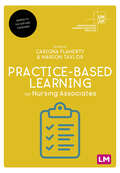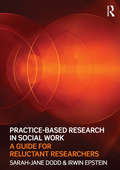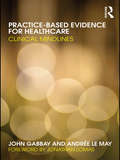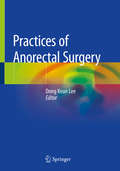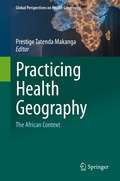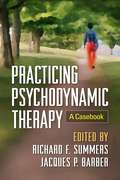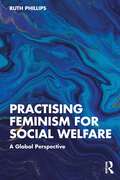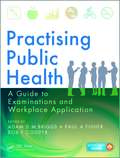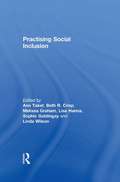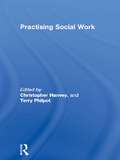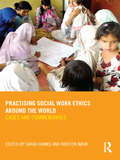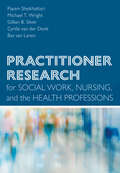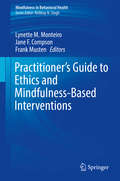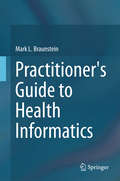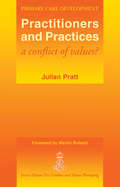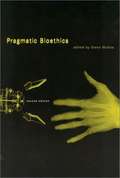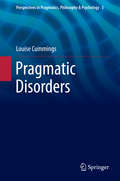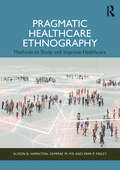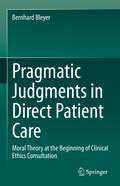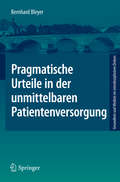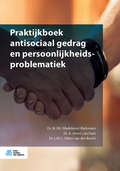- Table View
- List View
Practice-Based Learning for Nursing Associates (Understanding Nursing Associate Practice)
by Marion Taylor Cariona FlahertyThis book will help you to prepare for and excel in your nursing associate practice placements. Covering all settings and all fields of nursing, the book will show you how to make the most of each placement and transfer learning and skills from one area of practice to another. Key features: - Fully mapped to the NMC Standards of Proficiency for Nursing Associates (2018) - Helps you prepare for placements in a way that best supports your professional development and personal wellbeing - Case studies and activities introduce you to different settings across all fields of nursing - Focussed specifically on the requirements of the nursing associate role, helping you to develop into a confident professional practitioner THE SERIES: The Understanding Nursing Associate Practice series (UNAP) is a new collection of books uniquely designed to support trainee nursing associates throughout their training and into a professional career.
Practice-Based Research in Social Work: A Guide for Reluctant Researchers
by Irwin Epstein Sarah-Jane DoddThis unique textbook explores practice-based research (PBR), using numerous practice examples to actively encourage and engage students and practitioners to embrace research as a meaningful support for their practice. Whilst evidence-based practice gives practitioners access to information about "universal" best practices, it does not prioritize practitioner-generated knowledge or promote new research-based interventions relevant to their own practice circumstances as PBR does. This book discusses the evolution of PBR as a distinct social work research approach, describes its principles and methods and presents a range of exemplars illustrating the application of PBR within different practice methods in different practice settings. The chapters cover: Identifying the research question in a PBR model Designing a study and identifying a methodology Sampling Literature reviews Gathering data Ethics Analyzing data and interpreting results Putting research into practice Viewing the practitioner as central to the research process, and research as a necessary component of practice, this invaluable book emphasizes the seamless integration of practice and research. It is about research in social work practice rather than research on social work practice. Each chapter includes an overview, an introduction, and a key concepts summary. Practice-Based Research in Social Work is a very accessible text suitable for social work students, particularly MSW students, and practitioners.
Practice-based Evidence for Healthcare: Clinical Mindlines
by John Gabbay Andrée le MayThis book challenges the evidence-based practice movement to re-think its assumptions. Firmly rooted in real practice while drawing lucidly on a great breadth of theoretical frameworks, it examines afresh how clinicians use knowledge. Evidence-based practice has recently become a key part of the training of all health professionals. Yet despite its ‘gold-standard’ status, it is faltering because too much effort has gone into insisting on an idealised model of how clinicians ought to use the best evidence, while not enough has been done to understand why they so often don’t. Practice-based Evidence for Healthcare is a groundbreaking attempt to redress that imbalance. Examining how clinicians actually develop and use clinical knowledge day-to-day, the authors conclude that they use ‘mindlines’– internalised, collectively reinforced, tacit guidelines. Mindlines embody the composite and flexible knowledge that clinicians need in practice. They are built up during training and continually updated from a wide range of formal and informal sources. Before new evidence becomes part of practitioners’ mindlines, it is transformed by their interactions with colleagues and patients via their communities of practice and networks of trusted colleagues. To explore how mindlines work Gabbay and le May draw on a wide range of disciplines to analyse their detailed observations of clinical practice in the UK and the US. Their conclusions and provocative recommendations will be of value to all practitioners, health service managers, policymakers, researchers, educators and students involved in the promotion of evidence-based practice.
Practices of Anorectal Surgery
by Dong Keun LeeThis book combines provision of basic knowledge on anorectal diseases with clear description of special surgical techniques based on 30 years’ experience in anorectal cases at one hospital. A wide range of anorectal diseases and conditions are covered, in each case with presentation of relevant clinical information and detailed step-by-step descriptions of established surgical procedures and recently introduced approaches. The aim is to enable surgeons unfamiliar or less familiar with the procedures to gain a sound understanding of first principles and technical details that will assist them in the course of their future practice. In addition, expert analyses and commentaries are provided on the clinical practices of proctology in the form of case presentations. Without exception, the contributing authors are recognized authorities in their fields. Practices of Anorectal Surgery will be of high value for all junior surgeons who treat anorectal diseases, assisting in the achievement of optimal outcomes through meticulous technique and avoidance of surgery-related complications.
Practicing Harm Reduction Psychotherapy, Second Edition: An Alternative Approach to Addictions
by Patt Denning Jeannie LittleThis acclaimed clinical guide has helped thousands of clinicians put the proven principles of harm reduction into practice with therapy clients who have substance use problems. Written by pioneers in the field, the book shows how to do effective therapeutic work with people still using alcohol or other drugs. It provides clear guidelines for conducting comprehensive assessments, making collaborative treatment decisions, and implementing interventions that combine motivational, cognitive-behavioral, and psychodynamic strategies. The focus is reducing drug-related harm while also addressing co-occurring psychological and emotional difficulties. Detailed clinical illustrations are featured throughout. New to This Edition, Reflects over a decade of research advances and the tremendous growth of harm reduction clinical practice and training. Section on applications, with chapters on community-based settings, harm reduction groups, and working with families and friends. Chapters on biological and psychodynamic aspects of treatment. Expanded discussions of trauma, cultural sensitivity, and ethics. Supplemental resources and training materials at the authors' website.
Practicing Health Geography: The African Context (Global Perspectives on Health Geography)
by Prestige Tatenda MakangaThis volume uniquely presents case studies on health geography in Africa, and analyzes health practices in different African regions to illustrate a unified perspective to the geographies of health. The book describes various contemporary and traditional themes that have characterized the discipline of health geography, and uses its 13 case studies across 14 chapters to challenge the perceived dichotomy between health geography and medical geography among health researchers and practitioners. In 3 sections, the book provides readers with a comprehensive and interdisciplinary approach to understanding health geography in Africa.The first chapter introduces the major theories and perspectives in health geography, and how these characteristics apply to health geography practices in Africa. Section 1 discusses the different uses of space-based analyses in health geography, including geo-data infrastructures, geographies of disease burden, spatial epidemiology, spatially precise public health, and spatial access to health. Section 2 discusses the different uses of place-based analyses in health geography, including health representation, healthcare access, food allergies, and health determinants. Section 3 addresses how geography is incorporated into decision processes in Africa, and how policy planning shapes health-related interventions at the population and individual level. The case studies here discuss geo-enabling health records, health policy, public health planning, and mobile health geographies.
Practicing Medicine and Ethics
by Lauris Christopher KaldjianTo practice medicine and ethics, physicians need wisdom and integrity to integrate scientific knowledge, patient preferences, their own moral commitments, and society's expectations. This work of integration requires a physician to pursue certain goals of care, determine moral priorities, and understand that conscience or integrity require harmony among a person's beliefs, values, reasoning, actions, and identity. But the moral and religious pluralism of contemporary society makes this integration challenging and uncertain. How physicians treat patients will depend on the particular beliefs and values they and other health professionals bring to each instance of shared decision making. This book offers a framework for practical wisdom in medicine that addresses the need for integrity in the life of each health professional. In doing so, it acknowledges the challenge of moral pluralism and the need for moral dialogue and humility as professionals fulfill their obligations to patients, themselves, and society.
Practicing Psychodynamic Therapy
by Richard F. Summers Jacques P. BarberThis volume presents 12 highly instructive case studies grounded in the evidence-based psychodynamic therapy model developed by Richard F. Summers and Jacques P. Barber. Bringing clinical concepts vividly to life, each case describes the patient's history and presenting problems and takes the reader through psychodynamic formulation, treatment planning, and the entire course of therapy, including the challenges of termination. The cases address a variety of core psychodynamic problems, with outcomes ranging from very successful to equivocal. The emotional experience of the therapist is explored throughout. Commentary from Summers and Barber on every case highlights important points and key clinical dilemmas. See also the authored book Psychodynamic Therapy: A Guide to Evidence-Based Practice, in which Summers and Barber comprehensively describe their therapeutic model.
Practicing Sustainability
by David Green Barbara Oakley Penny Low Guru Madhavan David KoonSustainability applies to everybody. But everybody applies it differently, by defining and shaping it differently--much as water is edged and shaped by its container. It is conceived in absolute terms but underpinned by a great diversity of relatively "green"--and sometimes contradictory--practices that can each make society only more or less sustainable. In Practicing Sustainability, chefs, poets, music directors, evangelical pastors, skyscraper architects, artists, filmmakers, as well as scientific leaders, entrepreneurs, educators, business executives, policy makers, and the contrarians, shed light on our understanding of sustainability and the role that each of us can play. Each contributor addresses what sustainability means, what is most appealing about the concept, and what they would like to change to improve the perception and practice of sustainability. What emerges from their essays is a wide spectrum of views that confirm an important insight: Sustainability is pursued in different ways not only due to different interpretations, but also because of varying incentives, trade-offs, and altruistic motives. Practicing and achieving sustainability starts with a willingness to look critically at the concept. It also means enabling rich and vigorous discussion based on pragmatism and common sense to determine a framework for best ideas and practices. With time and the much needed critical thinking, sustainable development will become a more integral part of our culture. By sharing experiences and crisp insights from today's savants, Practicing Sustainability serves as a stepping stone to the future.
Practising Feminism for Social Welfare: A Global Perspective
by Ruth PhillipsThere has been an explosion of interest in feminism in recent years. This book argues it is still necessary and has a vital role. Feminism’s core objectives –to address the persistent issue of women’s inequality and ongoing sexism, and to fight against women’s oppression and improve women’s lives – remain of central value across the world. As a result, how feminism contributes to and improves social welfare, is overdue for re-examination. This text explores what feminism means in theory, policy, and practice as it is conceptualised and engaged within different social welfare contexts today. Beginning with an overview of feminist scholarship in the twenty-first century, it is mainly comprised of six substantive chapters that examine feminism from within a specific policy or practice setting. The topics discussed include globalisation and social justice, motherhood and reproductive rights, domestic violence, women’s experiences in criminal justice settings, and working with older people. Practising Feminism for Social Welfare concludes with a framework for feminist policy and practice in the era of the fourth wave, whilst acknowledging that there can be no single or hegemonic feminism across all sites of social and political processes and in all social welfare settings. Designed as an introduction to feminist practice for social policy and social work audiences, this volume will also speak to a range of academic disciplines, including sociology, criminology, politics, women’s studies, and gender and feminist studies.
Practising Public Health: A Guide to Examinations and Workplace Application
by Adam D M Briggs Paul A Fisher Rob F CooperPractising Public Health: A Guide to Examinations and Workplace Application helps public health professionals in the UK and elsewhere to optimise their everyday public health practice. The book incorporates theory, skills, tips, and examples that illustrate communication skills, listening skills, information assimilation, and how to make appropriat
Practising Social Inclusion
by Linda Wilson Beth R. Crisp Ann Taket Sophie Goldingay Melissa Graham Lisa HannaPractising Social Inclusion presents what we know about what works, and why, in promoting social inclusion and practising in a socially inclusive way. Contributing to the growing debates on social inclusion, this book moves beyond discussion of who it is that is socially excluded and the processes of exclusion. It draws on research and reflective practice to answer the vital question of how to actually work towards inclusion and includes five sections looking at different arenas for practice: policy; programme design; service delivery; community life; and research. Relevant to all those working to promote, or researching, human health and wellbeing, this book is especially suitable for practitioners, students and scholars in health promotion, social work, social policy, public health, disability studies, occupational therapy and nursing.
Practising Social Work
by Terry Philpot Christopher HanveyPracticing Social Workprovides a systematic exploratiuon of ar ange of social work approaches. Each chapter focuses on a single theme and explains the practice implications of a particular method.
Practising Social Work Ethics Around the World: Cases and Commentaries
by Sarah Banks and Kirsten NøhrEthics is an increasingly important theme in social work practice. Worldwide, social workers experience common ethical challenges (how to be fair, whether to break a rule, how to act in politically tense situations) in very different contexts – from disaster relief in China to child protection work in Palestine. This book takes as its starting point real life cases featuring ethical problems in the areas of: negotiating roles and boundaries, respecting rights, being fair, challenging and developing organisations and working with policy and politics. Each case opens with a brief introduction, is followed by two commentaries and ends with questions for reflection. The commentaries, written by authors from different countries, refer to relevant theories, concepts, practical matters, alternative courses of action and their implications. Features within the book include: An introductory chapter covering issues of global ethics Cases and commentaries drawn from across the world – from Peru to Finland Cases based on real life situations and chapter introductions from leading authorities in social work and ethical theory Questions and practical exercises to aid teaching and professional development This book is a unique and accessible resource for stimulating ethical reflection, expanding ethical horizons and developing ethical and intercultural sensitivity. It is designed for use by undergraduate and postgraduate students and professionals in the fields of social work, social education/pedagogy, social care work, international social work, community development, community organisation, youth work and related fields.
Practitioner Research for Social Work, Nursing, and the Health Professions
by Michael T. Wright Payam Sheikhattari Gillian B. Silver Cyrilla van der Donk Bas van LanenAn invaluable tool for health and social work students and professionals who want to improve their practice through collaborative research with patients, clients, and colleagues.Throughout history, some of the most prominent contributors to health and social sciences have been men and women comfortable with both practice and academia. But today, research in health-related fields is increasingly conducted in specialized settings by people who are first and foremost researchers. Critics bemoan this loss of practice-based research, long considered a vital part of the contribution that doctors, nurses, public health workers, and social workers can make both to their field and the communities in which they work. Unfortunately, the explosion of new discoveries in health-related fields, along with the exponential increase in the amount of knowledge being produced and the growing demands of practice, have caused both the production and application of knowledge to become highly specialized and increasingly complex. This has resulted in a widening gap between research and practice.Recognizing the need for a guide to this type of research, Practitioner Research for Social Work, Nursing, and the Health Professions is a thoroughly reimagined version of a book originally published in 2011 in the Netherlands. Aimed at American practitioners, it is a highly practical guide for anyone in social work, nursing, and other health care and social welfare settings. Its seven-step Practitioner Research Method offers readers a tried-and-true approach to conducting research in their own work environments, and the authors use real-world examples to highlight strategies for overcoming barriers and incorporating research.While leading practitioners through each stage of the research process, the authors explain in detail how to apply a variety of field-tested tools and techniques. A unique and indispensable resource for students in undergraduate and graduate research courses, as well as for seasoned professionals who seek a practical guide for developing and implementing their own research projects in social work, nursing, and the health professions, this book is also the first textbook to introduce the concept and practice of practitioner research to an American audience.
Practitioner's Guide to Ethics and Mindfulness-Based Interventions
by Lynette M. Monteiro Jane F. Compson Frank MustenThis book focuses on the role of ethics in the application of mindfulness-based interventions (MBIs) and mindfulness-based programs (MBPs) in clinical practice. The book offers an overview of the role of ethics in the cultivation of mindfulness and explores the way in which ethics have been embedded in the curriculum of MBIs and MBPs. Chapters review current training processes and examines the issues around incorporating ethics into MBIs and MBPs detailed for non-secular audiences, including training clinicians, developing program curriculum, and dealing with specific client populations. Chapters also examine new, second-generation MBIs and MBPs, the result of the call for more advanced mindfulness-based practices . The book addresses the increasing popularity of mindfulness in therapeutic interventions, but stresses that it remains a new treatment methodology and in order to achieve best practice status, mindfulness interventions must offer a clear understanding of their potential and limits. Topics featured in this book include: * Transparency in mindfulness programs. * Teaching ethics and mindfulness to physicians and healthcare professionals. * The Mindfulness-Based Symptom Management (MBSM) program and its use in treating mental health issues. * The efficacy and ethical considerations of teaching mindfulness in businesses. * The Mindful Self-Compassion (MSC) Program. * The application of mindfulness in the military context. Practitioner's Guide to Mindfulness and Ethics is a must-have resource for clinical psychologists and affiliated medical, and mental health professionals, including specialists in complementary and alternative medicine and psychiatry. Social workers considering or already using mindfulness in practice will also find it highly useful.
Practitioner's Guide to Health Informatics
by Mark L. Braunstein"This book will be a terrific introduction to the field of clinical IT and clinical informatics" -- Kevin Johnson "Dr. Braunstein has done a wonderful job of exploring a number of key trends in technology in the context of the transformations that are occurring in our health care system" -- Bob Greenes "This insightful book is a perfect primer for technologists entering the health tech field. " -- Deb Estrin "This book should be read by everyone. " -- David Kibbe This book provides care providers and other non-technical readers with a broad, practical overview of the changing US healthcare system and the contemporary health informatics systems and tools that are increasingly critical to its new financial and clinical care paradigms. US healthcare delivery is dramatically transforming and informatics is at the center of the changes. Increasingly care providers must be skilled users of informatics tools to meet federal mandates and succeed under value-based contracts that demand higher quality and increased patient satisfaction but at lower cost. Yet, most have little formal training in these systems and technologies. Providers face system selection issues with little unbiased and insightful information to guide them. Patient engagement to promote wellness, prevention and improved outcomes is a requirement of Meaningful Use Stage 2 and is increasingly supported by mobile devices, apps, sensors and other technologies. Care providers need to provide guidance and advice to their patients and know how to incorporated as they generate into their care. The one-patient-at-a-time care model is being rapidly supplemented by new team-, population- and public health-based models of care. As digital data becomes ubiquitous, medicine is changing as research based on that data reveals new methods for earlier diagnosis, improved treatment and disease management and prevention. This book is clearly written, up-to-date and uses real world examples extensively to explain the tools and technologies and illustrate their practical role and potential impact on providers, patients, researchers, and society as a whole.
Practitioners and Practices: A Conflict of Values?
by Martin Rowland Julian PrattGeneral practice is the cornerstone of primary care in the UK. However, this traditional model has been challenged by new visions of its role, particularly a responsibility for improving health as well as for the care of illness, and a responsibility for populations as well as for individuals. This book focuses on the development of general practice as a framework within which community nurses and other professionals can build their contibution to the future of primary care. In so doing it shows how the care of general practice can be maintained and strengthened. This work is intended for all primary care staff, including doctors, nurses and managers, and for anyone interested in the future of primary care in the changing NHS.
Pragmatic Bioethics (Second Edition)
by Glenn McgeeModern scientific and medical advances bring new complexity and urgency to ethical issues in health care and biomedical research. This book applies the American philosophical theory of pragmatism to such bioethics. Critics of pragmatism argue that it lacks a universal moral foundation. Yet it is this very lack of a metaphysical dividing line between facts and values that makes pragmatism such a rigorous and appropriate method for solving problems in bioethics. For pragmatism, ethics is a way of satisfying the complex demands of multiple individuals and groups in a contingent and changing world. Pragmatism also demands careful attention to the ways in which scientific advances change our values and ethics. The essays in this book present different approaches to pragmatism and different ways of applying pragmatism to scientific and medical matters. They use pragmatism to guide thinking about such timely topics as stem cell research, human cloning, genetic testing, human enhancement, and care for the poor and aging. This new edition contains three new chapters, on difficulties with applying pragmatism to law and bioethics, on helping people to die, and on embryonic stem cell research.
Pragmatic Disorders
by Louise CummingsThis wide-ranging survey of the state of the art in clinical pragmatics includes an examination of pragmatic disorders in previously neglected populations such as juvenile offenders, children and adults with emotional and behavioural disorders, and adults with non-Alzheimer dementias. This book makes a significant contribution to the discussion of pragmatic disorders by exploring topics which have a fast-rising profile in the field. These topics include disorders in which there are both pragmatic and cognitive components, and studies of the complex impacts of pragmatic disorders such as mental health problems, educational disadvantage and social exclusion. This book also presents a critical evaluation of our current state of knowledge of pragmatic disorders. The author focuses on the lack of integration between theoretical and clinical branches of pragmatics and argues that the work of clinicians is all too often inadequately informed by theoretical frameworks. She attempts to bridge these gaps by pursuing a closer alliance of clinical and theoretical branches of pragmatics. It is claimed that this alliance represents the most promising route for the future development of the field. At once a yardstick measuring progress thus far in clinical pragmatics, and also a roadmap for future research development, this single-author volume defines where we have reached in the field, as well as where we have to go next.
Pragmatic Healthcare Ethnography: Methods to Study and Improve Healthcare
by Erin P. Finley Alison B. Hamilton Gemmae M. FixThis practical and accessible textbook provides an overview of the key principles for conducting ethnography in healthcare settings. Shedding new light on healthcare delivery and experiences, ethnographic research methods provide a useful set of tools for observing how people act in the world and help us understand why people act as they do. Increasingly recognized for their explanatory power, especially around behavior and social context, ethnographic methods are an invaluable approach for understanding challenges and processes in healthcare services and delivery.This guide takes the reader step-by-step through the research process, from grant writing and study design to data collection and analysis. Each chapter, illustrated by a range of examples, introduces ethnographic concepts and techniques, considers how to apply them in pragmatic research, and includes suggestions for tips and tricks. An in-depth case study describing real-world ethnographic research in a healthcare setting follows each chapter to demonstrate both the “how to” and the value of ethnographic approaches. The case studies discuss why the researcher used ethnography, the specific approach taken, the setting for the work, and key lessons that demonstrate ethnographic principles covered in the related chapter.This is an essential text for researchers from a range of health-related backgrounds new to ethnographic methods, including students taking courses on qualitative research methods in health, implementation science, and applied anthropology.
Pragmatic Judgments in Direct Patient Care: Moral Theory at the Beginning of Clinical Ethics Consultation
by Bernhard BleyerWhy does a hospital need an ethics consultation? And what about this counselling is ethical? The book explains the background of the development of clinical ethics counselling. It provides new insights into serious decision-making conflicts in everyday clinical life and uncovers the disputes that followed in public. In the search for the ethical understanding of clinical ethics counselling, the book comes across previously unexplored evidence. Step by step, a system is reconstructed that reveals the shape of a significant philosophical school of thought.
Pragmatic and Discourse Disorders
by Louise CummingsAn essential study aid for students of speech and language pathology, this highly practical workbook includes short-answer questions and data analysis exercises which help students to test and improve their knowledge of pragmatic and discourse disorders. The book contains a detailed examination of the causes, language and cognitive features of these disorders and includes frequently encountered clinical populations and conditions that are overlooked by other texts. The use of actual linguistic data provides readers with an authentic insight into the clinical setting. • 200 short-answer questions help students to develop and test their knowledge of pragmatic and discourse disorders • 67 data analysis exercises provide readers with real-life clinical scenarios • Fully worked answers are provided for all exercises, saving the lecturer time and allowing the reader to self-test and improve understanding • A detailed glossary of terms makes the text a self-contained reference tool • Carefully selected suggestions for further reading are provided for each chapter.
Pragmatische Urteile in der unmittelbaren Patientenversorgung: Moraltheorie an den Anfängen Klinischer Ethikberatung (Gesundheit und Medizin im interdisziplinären Diskurs)
by Bernhard BleyerWozu braucht ein Krankenhaus eine Ethikberatung? Und was an dieser Beratung ist ethisch? Das Buch erklärt die Hintergründe der Entstehungsprozesse Klinischer Ethikberatung. Es gewährt neue Einblicke in schwerwiegende Entscheidungskonflikte des klinischen Alltags und deckt die vehementen Auseinandersetzungen auf, die sich öffentlich daran anschlossen. Auf der Suche nach dem Ethikverständnis der Klinischen Ethikberatung trifft das Buch auf bisher nicht ausgewertete Hinweise. Schritt für Schritt wird eine Systematik rekonstruiert, die die Gestalt einer bedeutsamen philosophischen Denkrichtung erkennen lässt.
Praktijkboek antisociaal gedrag en persoonlijkheidsproblematiek
by M. J. N. Madeleine Rijckmans A. Arno Van Dam L. M. C. Wies Van Den BoschBehandelaren in de GGZ worden in toenemende mate geconfronteerd met mensen met antisociale problematiek. Dit praktijkboek geeft handvatten voor de behandeling van mensen met antisociaal gedrag voortkomend uit persoonlijkheidsproblematiek. De handvatten zijn gebaseerd op wetenschappelijke kennis en best practices. Het boek is bedoeld voor psychologen, psychiaters, maatschappelijk werkenden en (sociaalpsychiatrisch) verpleegkundigen werkzaam binnen de reguliere en forensische GGZ. Praktijkboek antisociaal gedrag en persoonlijkheidsproblematiek laat aan de hand van praktijkvoorbeelden zien hoe de behandelaar kan omgaan met specifieke behandelsituaties en hulpvragen als agressie, middelengebruik en suïcidaliteit. Daarnaast beschrijft het boek methodes om cliënten en hun sociale omgeving te helpen het antisociale gedrag te veranderen of er beter mee om te gaan. Ook wordt er aandacht besteed aan de emoties die deze cliënten oproepen bij behandelaren en aan de vraag hoe behandelaren hier effectief mee om kunnen gaan. Het eerste deel beschrijft argumenten voor en tegen het behandelen van mensen met antisociaal gedrag of antisociale persoonlijkheidsproblematiek. Daarna worden de mogelijkheden van het doen van diagnostiek en risicotaxatie binnen de reguliere GGZ beschreven en wordt stilgestaan bij het belang van de therapeutische relatie. Vervolgens worden theorieën en technieken beschreven om de doelgroep te motiveren voor behandeling. In het tweede deel staan de meer specifieke problematieken van de doelgroep centraal, zoals het voorkomen en behandelen van agressie, omgaan met verslavingsproblematiek en suïcidaliteit. Het derde deel beschrijft specifieke behandelmethodieken, waaronder Dialectische gedragstherapie, de forensische variant van Schemagerichte therapie, Farmacotherapie, Systeemtherapie en een meer outreachende benadering. Praktijkboek antisociaal gedrag en persoonlijkheidsproblematiek is geschreven onder redactie van Dr. Madeleine Rijckmans, Dr. Arno van Dam en Dr. Wies van den Bosch. Zij werken alle drie als behandelaar in de klinische (forensische) praktijk en doen wetenschappelijk onderzoek. Ook zijn ze lid van het internationaal Podium Antisociaal Gedrag van waaruit ze proberen de behandelpraktijk voor deze doelgroep te verbeteren.
